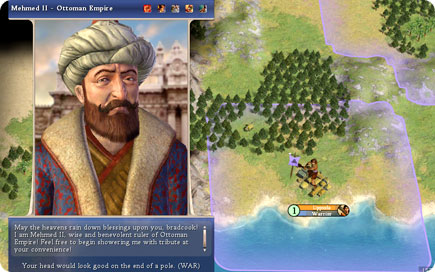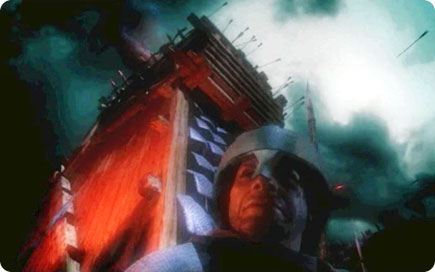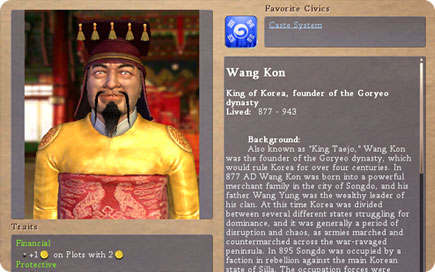- Site: Sid Meier’s Civilization IV: Warlords
- Publisher: Aspyr
- Developer: Firaxis
- Genre: Strategy
Game Media
Gold Edition (includes Civilization IV and Warlords) available for online ordering 24 hours a day, every day.
By Brad Cook
The Vikings swear allegiance to the Aztec Empire, becoming a vassal state to the most powerful civilization on the map. Unfortunately, that means the Vikings are also dragged into the conflict when Montezuma declares war on the English Empire, whose leader, Winston Churchill, angered him by declining an open borders agreement.

Meanwhile, the Celtic Empire, led by Brennus, moves a Great General into the same area as a Gallic Warrior, combining both into a powerful Warlord. Supported by a trebuchet and several axemen, the Warlord invades the neighboring Aztecs, putting Montezuma on the defensive just as he launches an attack on an English city.
Everyone seems to have forgotten the Korean Empire, however. With construction of the Temple of Artemis completed and the cultural influence of their cities encroaching on their neighbors, they’ve become a formidable opponent without going to war against any other civilization. Their leader, Wang Kon, has taken care not to offend his peers, but it’s increasingly clear that he’s not doing so for altruistic reasons.
New Wrinkles in Your Gameplay
Just when you think you’ve mastered all the ins and outs of Sid Meier’s Civilization IV, along comes the Warlords expansion pack to throw a wrench or two in your carefully-laid-out strategies. Six new empires — Carthage, the Celts, Korea, the Ottomans, the Vikings, and the Zulu — lead a stack of content that includes new leaders for four of the 18 civilizations that come with the game, as well as new buildings, units, Wonders, and three new leader traits. Each of the 24 civilizations in the game also now has a unique building, in addition to a unique unit. (see our sidebar, “The New Civilizations,” below.)
The Great General is another change in the game. He is a new type of person who can join a city as a military instructor, giving two extra experience points to new units created there, or build a military academy for a city, enabling the production of military units 25% faster. You can also designate him to become a Warlord leading troops into battle, giving those units free upgrades as well as access to special promotions, such as Combat VI and Medic III.
A new diplomatic option, vassalage, puts one civilization in sworn allegiance to another. This gives the vassal state the protection of its master, although at the cost of more unhappiness for its citizens. The master empire can freely travel through the vassal’s territory, demand the use of its resources, and take advantage of its fortifications, although at the price of higher maintenance costs for its own cities. If the master state goes to war, the vassal is automatically dragged into the conflict.
New Scenarios Expand the Action
In addition, Warlords features eight new scenarios, six based on real history and two taking place in alternate timelines. Now you can replay the Chinese unification of 450 BC, when seven feudal kingdoms fought to take complete control of the country. Or visit a more recent year, 1206 AD, as Genghis Khan rampaged across half the world in his quest to destroy every civilization in his path. You can even visit a world in which England and France fight each other for control of North America, using religion and culture as major weapons in the struggle.
Don’t forget that the Civilization IV player community continues to produce plenty of unique scenarios that could keep you busy for years to come, or, at the least, until the next historical real-time strategy game comes along. The official Civilization IV Web site offers links to four of the best fan sites, where you’ll find other players discussing tips and tricks, trading content they created with the game’s World Builder, and uploading resources for others to share.
Game Hardware
Check out our systems for your best gaming experience.

Go Ahead, Make My Century. Many of the new leaders in Warlords will expect you to immediately give in to their demands.

Siege Mentality. A stunning image from the game’s opening sequence.

The Civilopedia. Brush up on the additions to the game before you embark on your first conquest.

Civilization IV
Learn more about Civilization IV by reading our previous feature which covers the original version of the game. Spreading religion, using great people to further your empire’s efforts, a 3D graphics engine, the ability to choose between two leaders for some civilizations, robust modding tools, and a revamped interface highlight the changes.
If you liked this game, check out:
- Age of Empires II: Gold
- Age of Mythology
- Civilization III: Complete
- Legion Arena
- Rise of Nations: Gold Edition
System Requirements:
- Full version of Civilization IV
- Mac OS X version 10.3.9 (10.4.6 or higher recommended)
- 1.8GHz PowerPC G5 or Intel processor (2GHz or higher recommended)
- 512MB of RAM
- 64MB video RAM (128MB recommended; ATI Radeon 9600 or Nvidia GeForce FX 5200 or better)
- 3.5GB hard disk space
- Internet (TCP/IP) and LAN (TCP/IP) play supported. Internet play requires broadband connection.
The New Civilizations
| Civilization | Starting Technologies | Unique Unit | Unique Building | Leader |
|---|---|---|---|---|
| Carthaginian Empire |
|
Numidian Cavalry (immune to first strikes; 50% attack bonus vs. melee units; +30% withdrawal chance) | Cothon (replaces harbor; +1 trade route; +50% trade route yield; +1 health from clam, crab, fish) |
|
| Celtic Empire |
|
Gallic Warrior (+10% city attack; starts with Guerilla I fighting ability) | Dun (replaces walls; free Guerilla I promotion for units built in the city; 50% defense; double production speed with stone) |
|
| Korean Empire |
|
Hwacha (siege weapon that doesn’t receive defensive bonuses; 25% chance to withdraw from combat; causes collateral damage; +50% vs. melee units; can bombard city defenses) | Seowon (replaces university; +35% science; +3 culture) |
|
| Ottoman Empire |
|
Janissary (gunpowder unit; +25% vs. archery, mounted, and melee units) | Hammam (replaces aqueduct; +2 happiness; +2 health) |
|
| Viking Empire |
|
Berserker (+10% city attack; +50% vs. melee units) | Trading Post (replaces lighthouse; free Navigation I promotion for units built in that city; +1 food for water tiles) |
|
| Zulu Empire |
|
Impi (melee unit; +100% vs. mounted units; starts with Mobility, which knocks 1 off movement cost) | Ikhanda (replaces barracks; -20% maintenance; new land units receive +3 experience points) |
|
The English, Roman, Egyptian, and Russian empires also receive new leaders: Winston Churchill, Augustus Caesar, Ramesses II, and Josef Stalin, respectively. Churchill is charismatic and protective, and his favorite civic is nationhood. Caesar is creative and organized, while he favors the representation civic. Ramesses II is spiritual and industrious, preferring theocracy, while Stalin is aggressive and industrious, favoring the state property civic.
Our Civilization IV article explains the civics and leader traits, with the exception of the four civics laid out below. Those four civics aren’t new to the game, but they are preferred by some of the new leaders found in this expansion pack. There are 25 civics in the game total, but not all of them are preferred by one or more leaders, both new and old.
Warlords also includes three new leader traits: imperialistic (+100% Great General emergence; +50% faster production of settlers), charismatic (+1 happiness in all cities; +1 happiness for monument and broadcast tower), and protective (free Drill I and City Garrison I promotions for archery and gunpowder units; double production speed for walls and castles).


